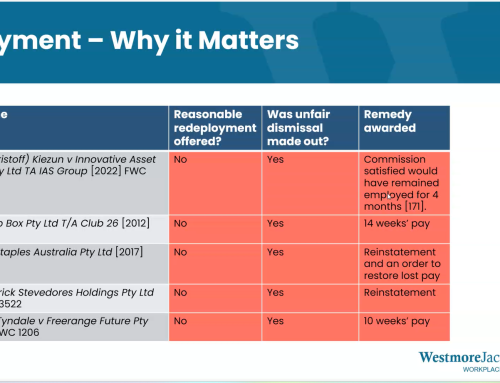
As with most years, employment law developed significantly in 2018.
Last year we discussed the law’s shift against flexible work arrangements. To an extent, 2018 continued that trend. The use of long-term casual engagements by many employers has been constrained by the Full Court of the Federal Court’s decision in WorkPac v Skene and the inclusion of casual conversion clauses into Modern Awards.
In this article, we outline three of the year’s most important developments in employment law and our top tips to employers and HR Managers to help deal with these changes.
Are casual employees actually casual? WorkPac v Skene
In August the Full Court of the Federal Court handed down its decision in WorkPac v Skene. This case clarified the approach courts should take when determining whether an employee is casual.
The Court held that just because an employee is engaged as a casual, considers themselves casual and is paid an “all in” flat hourly rate does not necessarily mean that employee is a casual.
Instead, courts will look at the relationship with a substance-over-form approach. In doing so, courts will weigh up various indicia to decide whether an employee is truly a casual or not a casual.
The most important factor pointing to an employee being permanent (i.e., not a casual) is if their employment is characterised by a “mutual advance commitment to work”. Generally, an employee will probably be casual if this mutual commitment is absent.
Employment which is irregular, uncertain, intermittent or unpredictable will generally lack a “mutual advance commitment to work”. Consequently, courts are more likely to characterise that employment as casual.
The Court held that the employee in WorkPac v Skene was not casual. This was notwithstanding the fact he had been engaged as a casual, had considered himself a casual, and had been paid an “all in” flat hourly rate.
The employee was not casual because his work was regular, predictable and continuous. Amongst other things, he worked to a roster provided 6 and 12 months in advance, with a regular 7-days-on 7-days-off schedule.
As the employee was not casual, he was entitled to be paid annual leave in addition to his “all in” flat hourly rate.
Following the Court’s decision, WorkPac has commenced proceedings in the Federal Court regarding another employee. WorkPac is seeking declarations that this employee is casual, or alternatively, if the employee is a not casual, that WorkPac can ‘set-off’ any casual loading it has paid to that employee against any unpaid permanent employee entitlements.
These proceedings will be interesting to follow. They will likely explore the reach of the WorkPac v Skene decision, and any strategies employers can take to mitigate its effects.
Following the WorkPac v Skene decision, employers should be careful when engaging casual employees in an overly-regular fashion and consider seeking legal advice regarding regular casual arrangements. Early advice may minimise the risk that a casual employee can ‘double dip’ and claim permanent employee entitlements in addition to casual loading.
If you are interested in a more in-depth discussion of the WorkPac v Skene decision, you can read our article on it here.
Casual conversion clauses
Last year the Fair Work Commission decided that all Modern Awards which did not already have a casual conversion clause should contain one. In October 2018, that decision came into effect. As a result, most Modern Awards now contain a casual conversion clause.
Eligible casual employees to whom a Modern Award applies now have the right to request to convert to permanent employment. Employers cannot refuse a conversion request unless they have consulted with the employee and have reasonable grounds for refusing the request. Employers must provide written reasons for refusing a request within 21 days of the request being made.
Employees who disagree with a refusal may choose to dispute that refusal using the Modern Award’s dispute resolution procedure.
Casual employees will be eligible to make a conversion request if they have worked a pattern of hours on an ongoing basis for 12 months, and could continue to work those hours as a permanent employee without significant adjustment.
Importantly, the clauses obligate employers to notify casual employees of the clauses’ existence. Employers must provide casual employees employed on or after 2 October 2018 with a copy of the applicable clause within 12 months of their first engagement. Casuals already employed as at 1 October 2018 must be given a copy of the applicable clause by 1 January 2019.
Employers should be careful to observe their obligations under these new clauses, including to not unreasonably refuse conversion requests. Employers who are unsure how to best handle these new obligations should consider seeking legal advice.
Who decides if an employee is incapable of performing their job: CSL Behring
For the purposes of unfair dismissal, an employer generally has a valid reason to dismiss an employee who is incapable of performing the inherent requirements of their job. Early this year, the Full Bench of the Fair Work Commission has clarified who determines, for the purposes of unfair dismissal, whether an employee is incapable of performing their job. In CSL Behring, the Full Bench held that the Fair Work Commission will determine whether an employee was incapable of performing their job, based on the evidence presented before it. In making this determination, the Commission will consider all relevant evidence. This is in contrast to the earlier (now overruled) approach in Lion Diary. In that case the Commission held that usually an employer would have a valid reason to dismiss an employee if they had received a medical opinion that an employee was incapable of performing their job. Following CSL Behring employers will need to act carefully before dismissing an employee for incapacity. They will need to ensure they have enough evidence to convince the Commission of the employee’s incapacity. The Commission will look to all relevant evidence (including medical opinions) when determining whether the employee was incapable of performing their job. Employees should seek legal advice before dismissing an employee for incapacity. Potential dismissals of this type can be complex. We wrote a more in-depth article on this topic earlier in the year. You can read it here. Adam Colquhoun Principal, WestmoreJacobs This article is general information only. It is not legal advice. If you need legal advice, please contact us. [1] A dismissal may be unfair even if there was a valid reason for the dismissal. For example, it may have been carried out in a procedurally unfair way.






Leave A Comment